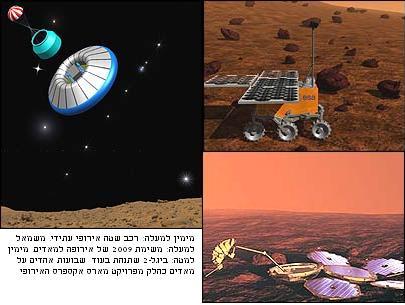UK commitment to next ESA Mars missions in doubt despite success so far of Beagle 2 project
Britain's commitment to the European Space Agency's next Mars mission is in doubt despite the success so far of the Beagle 2 project, which British academia and industry have pushed against all odds and which will land on Mars by Christmas.
The success of the lander left British companies in a key position to win additional space missions planned for the next decade. But budget cuts could leave Britain lagging behind other European countries in the race to explore the Red Planet with new landers and orbiters.
A future European program for the exploration of Mars is part of the Aurora project - a program of the European Space Agency to land spacecraft and perhaps eventually also humans on Mars.
The ExoMars mission slated for 2009 will investigate the planet's possible biology and pave the way for more ambitious proposals to bring samples from the Martian soil to Earth for testing.

Beyond the Beagle
British space and satellite company EDAS ASTRIUM built the Beagle 2 lander at its facilities in Stevenage, Hertfordshire. The company was also awarded a contract for a preliminary study of the costs and technical challenges involved in a mission to bring soil samples from Mars. It also submitted a proposal for the ExoMars to design an all-terrain vehicle that could move through sandy areas and dig 2 meters deep underground.
The European Space Agency has also chosen another British company, Surrey Satellite Technology in Guildford, Surrey, to develop and test a small spacecraft that will bring the soil samples from Mars to Earth. However, Britain's leadership in these initiatives could fall victim to the funding problems of the space sciences field.
European Space Agency contracts are awarded on the basis of a fair return - countries that invest more money in the space program can expect a larger share of the tenders. The UK signed up to the initial phase of the cursed program two years ago and invested 1.4 million euros. It now has to decide whether to join the full plan, which includes two new missions to Mars. The deadline is at the next ministerial meeting of the European Space Agency at the end of 2004. There is also another flight on the way. The European Space Agency asked its member states to pay hefty subscription fees until the end of 2003 to speed up the space programs. The UK was asked to add another 8 million euros.
